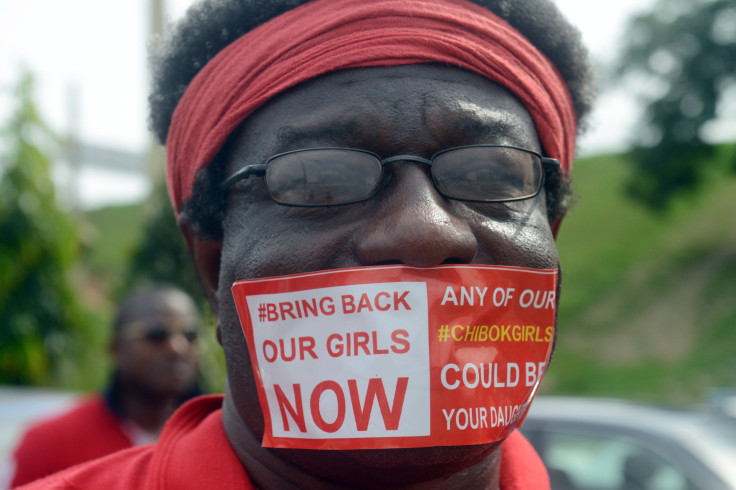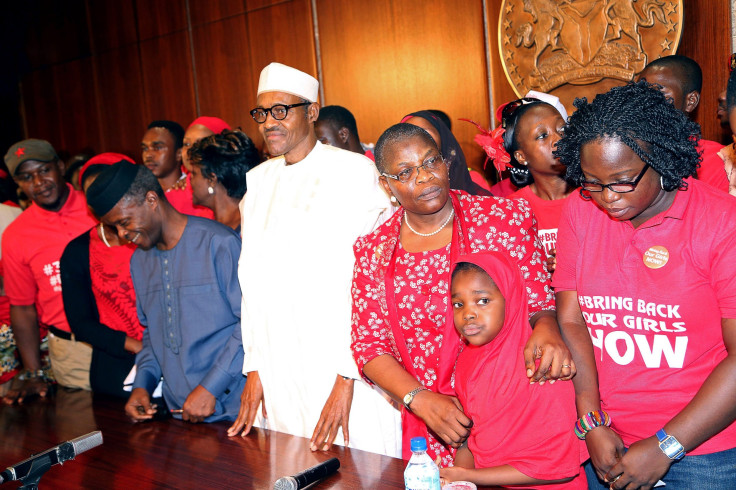Goodluck Jonathan Spent Over $4M Lobbying Against Nigeria's 'Bring Back Our Girls' Campaign, Lawyer Claims

A U.S.-based human rights lawyer and humanitarian worker said Tuesday that former Nigerian President Goodluck Jonathan spent more than $4 million, or about 1 billion naira, on lobbying against the Bring Back Our Girls movement last year, after Boko Haram abducted hundreds of schoolgirls from the northeast town of Chibok. In an interview with a Nigerian newspaper, Emmanuel Ogebe said the Jonathan administration’s response to the kidnapping was a “colossal failure.”
“The Jonathan-led-government had spent over $4 million fighting the Bring Back Our Girls campaign and almost fighting the veracity of the abduction, saying it wasn't true,” Ogebe told Premium Times Tuesday. “The response was a colossal failure, it was an unmitigated disaster.”
Boko Haram militants descended on a boarding school in northeast Nigeria on the night of April 14, 2014. By morning, the militant group had herded 276 schoolgirls into trucks and vanished behind the forest brush in the town of Chibok. Some of the girls have managed to escape on their own since then, but over 200 are still missing, and government search efforts have been unsuccessful despite a global social media campaign and pleas from international leaders.
Jonathan, who was president at the time, spent more money fighting the campaign than helping the girls or their families, according to Ogebe, who cited records published in the United States. “People’s children have been abducted. Instead of addressing the issues at hand, you bring about conspiracy theories, you attack the parents, you claim the opposition are out to rubbish you, and then you hire PR companies at millions of dollars to launder your image,” Ogebe, who was born in Nigeria and exiled to the United States after becoming a political detainee for speaking out against Nigerian dictator Gen. Sani Abacha, told Premium Times. “ I did not see anywhere where that level of assistance was pumped into the Chibok community.
The girls’ plight garnered attention on Twitter last year using the hashtag #BringBackOurGirls. High-profile political figures such as first lady Michelle Obama, former Secretary of State Hillary Rodham Clinton and British Prime Minister David Cameron endorsed the campaign. But the conversation on social media never rendered political action, highlighting the disconnect between public support and political will that often arises in international conflict, media experts said.
“Emotional stories like this one play particularly well on social platforms, which further speeds up sharing and spreading,” Kate Brodock, president of Girls in Tech and an adjunct professor at the S.I. Newhouse School of Public Communications at Syracuse University, told IBT in April. “It was a perfect storm of user behavior and compelling story. But real change will more likely come with follow-up action and efforts.”

The lack of action proved to be a political embarrassment for Jonathan, who lost his bid for a second term in March after he was widely condemned for his slow response to the Chibok kidnapping. Ogebe said he’s confident President Muhammadu Buhari, who won the election and took office in late May, will be more effective. Buhari, a former military ruler, has vowed to crush Boko Haram in a matter of months, but the Islamic militants have ramped up attacks.
“Anyone who comes in and does the opposite [of the last administration] will do better. That said, Boko Haram’s atrocities since the handover have heightened,” Ogebe told Premium Times. “When [Buhari] said that he is giving three months for it to be wiped out, we hope that this is not the three months that has been announced over and over again. But as a military person himself, he has a formula, battle plan and strategy to extinguish the Boko Haram menace.”
Boko Haram, which pledged allegiance to the Islamic State group in March, was the deadliest terrorist organization in 2014. While the Islamic State group, also known as ISIS, was reportedly responsible for 6,073 deaths in 2014, Boko Haram was even more deadly, accounting for 6,644 fatalities, a 300 percent increase over the previous year, according to the Global Terrorism Index, published by the Institute for Economics and Peace, a global think tank headquartered in Sydney.
Since launching its Islamic insurgency in northeastern Nigeria six years ago, Boko Haram has expanded its rampages into neighboring Cameroon, Chad and Niger. The Sunni militant group has killed about 20,000 people and displaced more than 2 million. Like ISIS, Boko Haram seeks to establish a caliphate governed by Islamic law, aka Shariah.
© Copyright IBTimes 2024. All rights reserved.





















